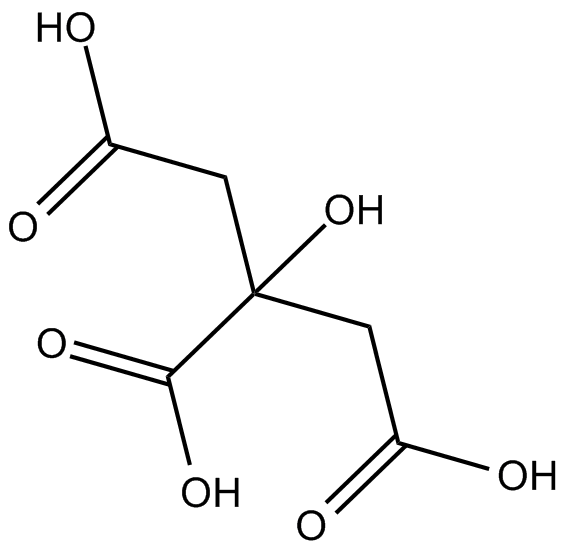Citric acid |
| Catalog No.GC14203 |
Commonly used laboratory reagent
Products are for research use only. Not for human use. We do not sell to patients.

Cas No.: 77-92-9
Sample solution is provided at 25 µL, 10mM.
Citric acid is a weak organic tricarboxylic acid found in citrus fruits. Citric acid is a natural preservative and food tartness enhancer.
Citric acid induces apoptosis through the mitochondrial pathway in the human keratinocyte cell line HaCaT. It inhibits proliferation of HaCaT cells in a dose-dependent manner, but also induces apoptosis and cell cycle-arrest at the G2/M phase (before 24 h) and S phase (after 24 h)[1].
Citric acid is found in all animal tissues as an intermediary substance in oxidative metabolism. The administration of citric acid (1–2 g/kg) attenuates LPS-induced elevations in brain MDA, nitrite, TNF-α, GPx, and PON1 activity. In the liver, nitrite is decreased by 1 g/kg citric acid. Citric acid (1-2 g/kg) decreases brain lipid peroxidation and inflammation, liver damage, and DNA fragmentation[2]. Citric acid supplementation increases intestinal calcium and phosphorus absorption and the retention/intake ratio only in rats fed the 1% Ca diet. Citric acidsupplementation together with a calcium-rich diet allows to obtain an increased retention of calcium and phosphorus in bone. The prolonged administration of calcium citrate supplements may therefore help to increase bone mineral concentration[3]. Oral administration of citric acid ameliorates ketosis and protects against the development of diabetic complications in an animal model of type 1 diabetes[4].
Reference:
[1]. Ying TH, et al. Citric acid induces cell-cycle arrest and apoptosis of human immortalized keratinocyte cell line (HaCaT) via caspase- and mitochondrial-dependent signaling pathways. Anticancer Res. 2013 Oct;33(10):4411-20.
[2]. Abdel-Salam OM, et al. Citric acid effects on brain and liver oxidative stress in lipopolysaccharide-treated mice. J Med Food. 2014 May;17(5):588-98.
[3]. Lacour B, et al. Stimulation by citric acid of calcium and phosphorus bioavailability in rats fed a calcium-rich diet. Miner Electrolyte Metab. 1997;23(2):79-87.
[4]. Nagai R, et al. Citric acid inhibits development of cataracts, proteinuria and ketosis in streptozotocin (type 1) diabetic rats. Biochem Biophys Res Commun. 2010 Feb 26;393(1):118-22.
Average Rating: 5 (Based on Reviews and 9 reference(s) in Google Scholar.)
GLPBIO products are for RESEARCH USE ONLY. Please make sure your review or question is research based.
Required fields are marked with *




















